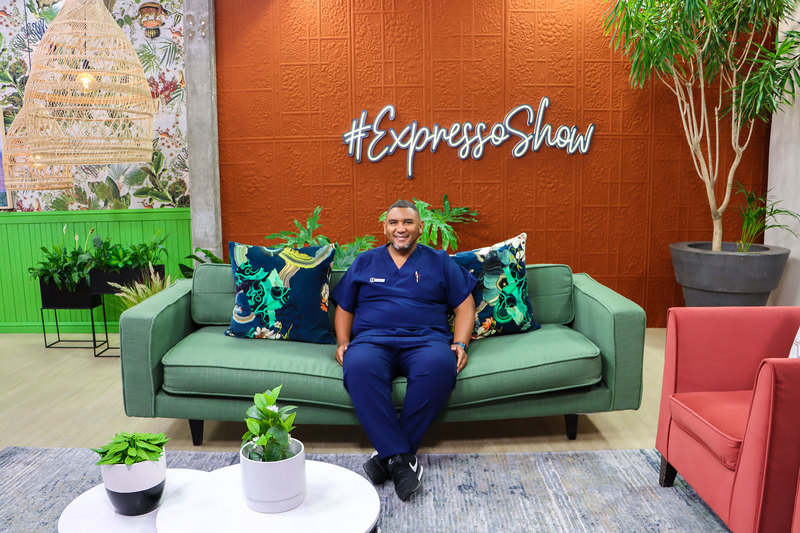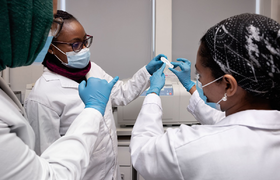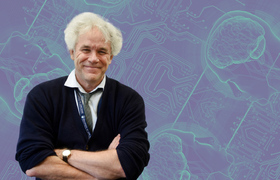Randall Ortel leverages power of social media to promote health education
22 September 2023 | Story Niémah Davids. Photo Supplied. Read time 8 min.
The University of Cape Town’s (UCT) Dr Randall Ortel has taken interacting with patients to a whole new level – leveraging the power of social media to encourage his followers to take care of their physical and mental health. And while he provides expert advice on a range of health conditions, from cardiovascular disease and diabetes to the potential origin of that nagging back pain, the disclaimer remains clear – always visit a healthcare provider’s office to confirm and manage a diagnosis.
Dr Ortel is a family medicine specialist, and an occupational, emergency and obstetric medical practitioner. He’s a lecturer in UCT’s Department of Family Medicine, which is attached to Groote Schuur Hospital (one of UCT’s teaching hospitals). He also serves as the manager for medical services at Karl Bremer hospital – a large district hospital in the Cape Metropole.
“My aim has always been to get people to take better care of themselves. So, I decided that because social media is such a powerful tool that allows us to disseminate information at the click of a button and has the potential to spread rapidly; I thought why not give it a try. I wanted to see if it served its intended purpose and reached a large audience in a short space of time, and it did. The response I continue to receive has been overwhelming and heartwarming,” he said.
Ortel circulates health-related content on social media channels like TikTok, Facebook, Instagram and X (formerly Twitter), and his followers have even extended beyond South Africa’s borders to other African countries including Uganda, Nigeria, Cameroon and Tanzania.
How it all started
But how did it all start? In 2021 during the height of the COVID-19 pandemic, Ortel decided to use his social media platforms to raise awareness on the COVID-19 vaccine. His aim, he explained, was to encourage his followers to get inoculated. By then, thousands of South Africans had succumbed to the virus, and getting as many adults vaccinated was critical to beat the pandemic.
As a frontline worker, Ortel was part of the first batch of South Africans to receive his vaccine, and he documented his vaccination journey. Thereafter, he proceeded to post a series of COVID-19 vaccine videos that covered a range of other topics. These, he added, included its side-effects; the fact that it complies with sharia (Islamic) law and therefore permitted for use by Muslims; and the importance of booster shots.
“I gained so much traction during my series on access to safe abortions and the ethical dilemmas we face with regard to termination of pregnancies.”
Everything skyrocketed from there. These days, his subject matter is all-encompassing. He has presented videos on the benefits of exercise for patients with cardiovascular disease; the tell-tale signs of hypertension; how to use a blood pressure monitor and interpret the readings; the importance of blood donation; and tips on how to manage patients with terminal illnesses – demystifying the stigma around palliative care. He also discusses important societal issues like gender-based violence (GBV) and his GBV video garnered a whopping 4.3 million views. According to Ortel, his followers were also particularly interested in his series on women’s health challenges, which touched on menstruation, menstrual abnormalities such as irregular bleeding and the importance of maintaining a regular cycle; menopause; teenage pregnancy and access to safe abortions.
“I gained so much traction during my series on access to safe abortions and the ethical dilemmas we face with regard to termination of pregnancies. This is also where I gained followers from other African countries, where abortions or termination of pregnancies are illegal. I answered many very important questions on this topic. That experience taught me that while our healthcare system here at home has endless challenges, we’ve come a long way compared to our African counterparts,” Ortel said.
Information and knowledge exchange
While his goal has always been to empower his followers to take charge of their overall health and well-being, Ortel said his series on teenage pregnancies and access to safe abortions served as an eye opener on the value of information sharing on social media platforms.
“Not everyone on the continent has the privilege of accessing healthcare the way we do in South Africa, and it’s especially challenging for women and girls in remote areas on the continent to access gynaecological care. I think that’s why my videos on menstruation and safe abortions were so successful and spread so quickly. These women had questions, and I was able to answer them,” he said.
He provides succinct, interactive and engaging content that gives his followers the information they need in a short video clip or just a few words. It’s free of medical jargon and easy to digest, which means his followers can consume his content just about anywhere – while waiting for a bus or train, during the ride home in a taxi, or even while preparing dinner for the family.
“I consider myself a lifelong learner, so this process is valuable for me too.”
Ortel also hosts TikTok live question-and-answer sessions, which give his followers an opportunity to ask questions, clear uncertainties and verify information. These sessions allow him to understand his followers’ thought processes and how they consume information, which assists with adjusting and improving his material. And he always learns something new from these engagements too.
“I consider myself a lifelong learner, so this process is valuable for me too. I’m always learning from my followers. Their feedback has been great. Patients actually take my videos into their healthcare providers’ offices during a consultation to highlight a topic that I discussed and to explain how and why they can relate. This is what I want to see,” he said.
Always seek medical advice
But more than raising awareness on key healthcare challenges, he said his content also serves as a wakeup call and allows many of his followers to identify signs and symptoms that they may have overlooked and motivate them to visit a healthcare professional for a full examination and further investigation.
With close to 50 000 followers on TikTok alone, 70% of whom are women, Ortel always stresses the importance of consulting with a healthcare professional to diagnose a medical condition. He said while social media channels are effective tools to create awareness, they cannot be used to make a diagnosis. And although the concept of telemedicine (telephone and online consultations) is gaining momentum globally, Ortel said it remains an illegal practice if a physical examination and diagnosis have not yet taken place.
“Online consultations are not recommended because they are simply not confidential, and information can easily be overlooked. However, those who offer telemedicine as a specialty need should follow strict guidelines as prescribed by the Health Professions Council of South Africa, which includes having made an in-person diagnosis first,” he said.
“My followers understand that the information I put out there is just a guide.”
“My followers understand that the information I put out there is just a guide. They still need to see a healthcare provider for a diagnosis. For me, what’s important is that they find value in my content as a starting point, and that I am able to make a difference in their lives by helping them identify certain health concerns, encourage them to reach out to a medical provider for a formal diagnosis and to receive the healthcare they need. That’s half the battle won.”
 This work is licensed under a Creative Commons Attribution-NoDerivatives 4.0 International License.
This work is licensed under a Creative Commons Attribution-NoDerivatives 4.0 International License.
Please view the republishing articles page for more information.










